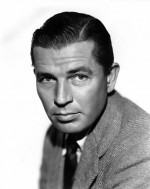
Hollywood stalwart Bruce Cabot's main claim to fame, other than rescuing Fay Wray from "King Kong", is that he tested for the lead role of The Ringo Kid in John Ford's Western masterpiece "Stagecoach". John Wayne got the role and became the most durable star in Hollywood history, while Cabot (eventually) found himself a new drinking partner when the two co-starred in "Angel and the Badman". In the latter stages of his career, Cabot could rely on Wayne for a supporting part in one of the Duke's movies.
It wasn't always so. In the 1930s Cabot's star shone bright. He was born with the unlikely name Etienne Pelissier Jacques de Bujac in Carlsbad, New Mexico, the son of French Col. Etienne de Bujac and Julia Armandine Graves, who died shortly after giving birth to the future Bruce Cabot. After leaving the University of the South in Sewanee, Tennessee, the future thespian hit the road, working a wide variety of jobs including sailor and insurance salesman, and doing a stint in a knacker's yard. In 1931 he wound up in Hollywood and appeared in several films in bit parts.
The young Monsieur de Bujac met David O. Selznick, then RKO's central producer (a job akin to Irving Thalberg's at MGM), at a Hollywood party, which led to an uncredited bit part as a dancer in "Lady with a Past" and a supporting role in "The Roadhouse Murder". On a parallel career track at the time, Marion Morrison (John Wayne) had failed to follow up on his audacious debut in Raoul Walsh's "The Big Trail" (the Duke had appeared in 18 movies previously but had only been billed in one, as "Duke Morrison" in the unlikely John Wayne vehicle "Words and Music"). Cabot and Wayne eventually appeared in 11 films together.
Although Cabot was prominently featured in the blockbuster "King Kong" in 1933, he never did make the step to stardom, though he enjoyed a thriving career as a supporting player. He was a heavy in the 1930s, playing a gangster boss in "Let 'em Have It" and the revenge-minded Native American brave Magua after Randolph Scott's scalp in "The Last of the Mohicans"; over at MGM, he ably supported Spencer Tracy as the instigator of a lynch mob in Fritz Lang's indictment of domestic fascism, "Fury". A freelancer, he appeared in movies at many studios before leaving Hollywood for military service. Cabot worked for Army intelligence overseas during World War II; after the war, he continued to work steadily, with and without his friend and frequent co-star, the Duke.
Bruce Cabot died in 1972 of lung and throat cancer. He was 68 years old.
Name: Bruce Cabot
Powered by ©Scriptburn - 2025